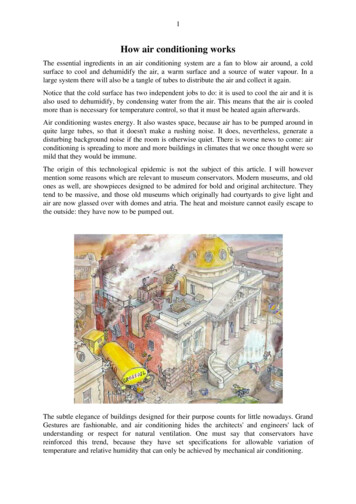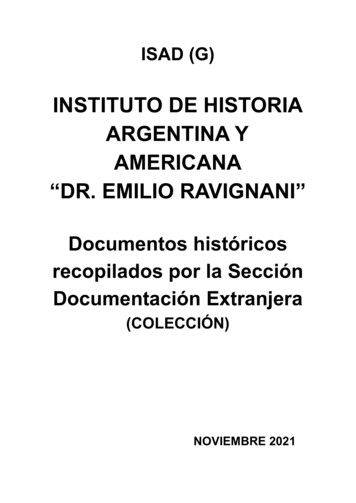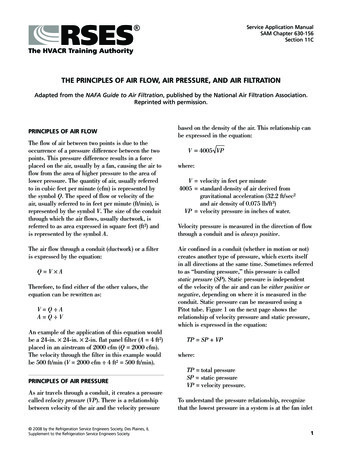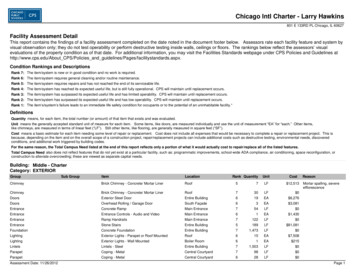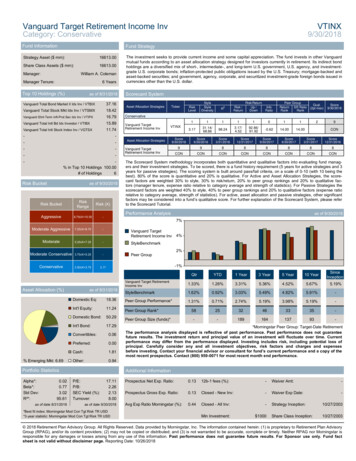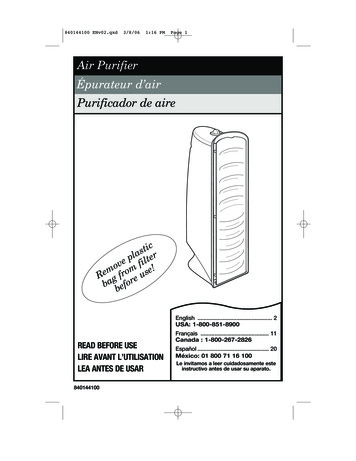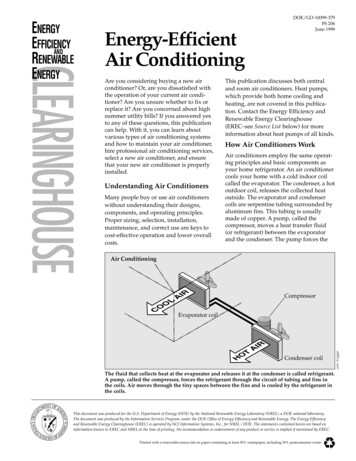
Transcription
AIR CONindexTHE Inconvenient TRUTHABOUT GLOBAL WARMINGIan Wishart #1 BESTSELLING AUTHOR293
Chapter SixteenThe Real Agenda“A world government [can] only be created out of war orcrisis – an emergency that provide[s] an appropriate combi nation of the motivations of fear and opportunity”– Herman Kahn, Council on Foreign Relations, 1993338So if the climate science is wrong, what’s the real motivationhere? Why are so many people prepared to spend so muchmoney convincing the public there’s a secular Armageddonawaiting them?You don’t have to look past the usual suspects, Greed and Power.The battle to convince you of the reality of “climate change” isintricately entwined with the collapse of the world financial marketsand the growing push for a de-facto world government.Nobel Peace Prize winner and former Secretary of State HenryKissinger told CNBC that the election of President Obama, combinedwith a unique set of crises, have created a political ‘perfect storm’.“The president-elect is coming into office at a moment when thereis upheaval in many parts of the world simultaneously His task willbe to develop an overall strategy for America in this period when,really, a new world order can be created. It’s a great opportunity, itisn’t just a crisis.”339Yeah, it’s the old ‘New World Order’ theory again, and I’d betempted to write it off as well, except for the inconvenient fact thatglobalists keep on repeatedly talking about it. Clearly, it’s on theiragenda whether we choose to believe it or not.338 “World Federal Government”, essay by Herman Kahn and Anthony J Wiener, in Uniting thePeoples and Nations, published by World Federalist Association 1993339 “Kissinger: Obama primed to create ‘New World Order’, WorldNetDaily, 6 January 2009216
T h e Re a l Agen da“Global issues demand global solutions”340, is the buzzphrase beingapplied both to climate change and to the financial crisis. You’llspot it in a number of places, as I have footnoted, or perhaps in itsnew manifestation as “a global New Deal”, but perhaps the mostdisturbing reference is this one:“Global problems demand global solutions. And the UnitedNations is, truly, the world’s only global institution,” UN Secretary-General Ban Ki-moon told his audience at a meeting organizedby the World Affairs Council.341“Polls show that even larger majorities – 74 per cent to be exact –believe the United Nations should play a larger role in the world.”Now that former New Zealand Prime Minister, climate change priestessand globalisation powerhouse Helen Clark has taken up her new postheading the UN Development Programme this year, you can expect thatorganisation’s dream of reining in the USA under UN hegemony andcreating Kissinger’s ‘new world order’ to come a whole lot closer.342Speaking in San Francisco, the birthplace of the United Nations,Ban told his audience that climate change is the opportunity formassive new growth in the UN’s power and influence.“San Francisco is the birthplace of the United Nations, which wascreated to save this world from the scourge of war. I’m here to discussthe future of our planet Earth, and this can become the birthplaceof a new movement to save it for future generations,” he said.It sounds so noble, but the origin of the business end of theglobal warming industry – the real agenda – is a tale of sleaze,power-hungry bureaucrats and an ungodly alliance of big businessand non-governmental organisations (NGOs) who saw a chance tocoat-tail on climate change panic and control world markets andenvironmental policies.You’ll recall that NASA’s James Hansen was one of the first topublicly hype the global warming threat at a 1988 congressionalhearing. You’ll also recall Hansen served as a science consultantfor Al Gore, and how Hansen received a 250,000 grant from theHeinz Foundation, run by 2004 presidential hopeful John Kerry’swife, Teresa Heinz-Kerry.340 http://www.britishcouncil.org/bern manifesto on climate change-4.pdf 341 “UN best-placed to tackle global problems in today’s world – Ban Ki-moon”, UN news release,26 July 2007, http://www.un.org/apps/news/story.asp?NewsID 23345&Cr San&Cr1 Francisco342 For a biography of Helen Clark, see Absolute Power by Ian Wishart, Howling At The MoonPublishing, 2008, ISBN 9780958240130, http://www.ianwishart.com, or Amazon.com217
air conWell, that same James Hansen was also a global warming consultant to a company called Enron,343 which – as you’ll recall – wentbelly-up in 2002 owing more than 6 billion.The deeper reasons for Enron’s collapse are irrelevant here, but thatcompany’s central role in the business model for climate change issomething everyone needs to understand.Enron was a giant American energy company that was diversifyingout of coal and into natural gas, solar and wind power. It ownedthe largest gas pipeline in the world outside of Russia, and it knewsoon after Hansen’s original testimony in 1988 that the writing wason the wall for excessive carbon-burning fuels.Natural gas has a significantly lower carbon footprint than coal,so Enron also knew that if it could corner the gas market and makecoal uneconomic as a competitor, Enron’s shareholders stood tomake huge amounts of money through the company’s gas, windand solar operations worldwide.But Enron needed help in Washington to make it happen. TheClinton administration, with Al Gore in the veep-seat, took officeearly 1993, and Enron wasted no time saying hello. Gore had playeda key role in the 1988 global warming hearings and was keen to usehis new-found power to push the alarm-bells on climate change.The Democrats had been working feverishly since 1988 to developa ‘green’ business model. Senators John Heinz and Tim Wirth cosponsored “Project 88”, which was intended to provide a pathway forbusinesses to make money out of environmental issues, by buyingand selling excess emissions credits for sulphur dioxide and nitrogenoxide – a couple of components in acid rain. Carbon dioxide wasnot, at that stage, on anyone’s horizon. Project 88 became the 1990Clean Air Act.The Heinz name has already featured in this tale, but rememberTim Wirth’s as well.In 2005, Investigate magazine published a popular backgrounder onthe Enron/Kyoto Protocol link, by weather forecaster Ken Ring:344“Without Enron there would have been no Kyoto Protocol. About20 years ago Enron was owner and operator of an interstate networkof natural gas pipelines, and had transformed itself into a billion343 “Why Enron wants Global Warming”, Patrick J. Michaels, Cato Institute, http://www.cato.org/pub display.php?pub id 3388344 “The Kyoto Conspiracy: how Enron hyped global warming for profit”, Ken Ring, Investigate,October 2005218
T h e Re a l Agen dadollar-a-day commodity trader, buying and selling contracts andtheir derivatives to deliver natural gas, electricity, internet bandwidth, whatever.“The 1990 Clean Air Act amendments authorized the Environmental Protection Agency to put a cap on how much pollutant theoperator of a fossil-fuelled plant was allowed to emit. In the early1990s Enron had helped establish the market for, and became themajor trader in, EPA’s 20 billion-per-year sulphur dioxide cap-andtrade program, the forerunner of today’s proposed carbon credittrade. This commodity exchange of emission allowances causedEnron’s stock to rapidly rise.“Then came the inevitable question, what next? How about acarbon dioxide cap-and-trade program? The problem was that CO2is not a pollutant, and therefore the EPA had no authority to capits emission. Al Gore took office in 1993 and almost immediatelybecame infatuated with the idea of an international environmentalregulatory regime. He led a U.S. initiative to review new projectsaround the world and issue ‘credits’ of so many tons of annual CO2emission reduction.”Among the new appointees to the Clinton administration wasformer Colorado Democrat senator Tim Wirth, the new Undersecretary of State for Global Affairs. Wirth worked closely withGore on climate and environmental issues, and Enron boss KenLay cultivated a relationship with Wirth to push the idea of somekind of market for carbon credits.“Under law a tradable system was required, which was exactly whatEnron also wanted because they were already trading pollutant credits,” says Ken Ring. “Thence Enron vigorously lobbied Clinton andCongress, seeking EPA regulatory authority over CO2. From 1994to 1996, the Enron Foundation contributed nearly 1 million dollars– 990,000 – to the Nature Conservancy, whose Climate ChangeProject promotes global warming theories. Enron philanthropistslavished almost 1.5 million on environmental groups that supportinternational energy controls to ‘reduce’ global warming.“Executives at Enron worked closely with the Clinton administration to help create a scaremongering climate science environmentbecause the company believed the treaty could provide it with amonstrous financial windfall. The plan was that once the problemwas in place the solution would be trotted out,” writes Ring.219
air conAmong the bedfellows Enron roped into the cause were the HeinzFoundation and the Pew Center, whose climate change divisionheavily hyped the global warming paranoia. Enron pumped serious money into groups like Pew, and stooped to some serious dirtytricks in the process.A 1998 letter signed by Enron’s then-CEO, Ken Lay, begged “President Clinton, in essence, to harm the reputations and credibility ofscientists who argued that global warming was an overblown issue.Apparently they were standing in Enron’s way,” writes the CatoInstitute’s Patrick J. Michaels.“The letter, dated Sept 1, asked the president to shut off the publicscientific debate on global warming, which continues to this date.In particular, it requested Clinton to ‘moderate the political aspects’of this discussion by appointing a bipartisan ‘Blue Ribbon Commission’,” continues Michaels.“The purpose of this commission was clear: high-level trashing ofdissident scientists. Setting up a panel to do this is simple – just lookat the latest issue of Scientific American, where four attack dogs werecalled out to chew up poor Bjorn Lomborg. He had the audacity topublish a book demonstrating global warming is overblown.“Because of the arcane nature of science, it’s easy to trash scientists.Imagine a 1940 congressional hearing to discredit Einstein. ‘Thisman actually believes the faster you drive, the slower your watchruns. Mr. Einstein, then why weren’t you here yesterday?’ The public,listening on radio, immediately concludes this Princeton weirdo isjust another academic egghead. End of reputation.“The proposed commission was billed as an ‘educational effort’that would lead to ‘subsequent policy actions’, which the letter itselfrecommended. These included a directive to ‘establish the rules forcrediting early, voluntary emissions reductions [of carbon dioxide].’And who was going to sell these credits? Enron, of course.”Enron poured huge amounts of money into greasing the rightpolitical palms. Internal Enron memoranda disclose some of theseactivities, such as an August 4, 1997 meeting at the Whitehousewith Clinton and Gore to drum out an approach to the upcomingKyoto conference that December.345“In an August 1997 memo by Mr. Lay to all Enron employees,345 “Controlling hypocritical authority”, Christopher Horner, National Review, 23 April 2002, er042302.asp220
T h e Re a l Agen dathe chairman said Mr. Clinton and Mr. Gore had ‘solicited’ hisview on how to address the issue of global warning ‘in advance ofa climate treaty to be negotiated at an international conference.’That memo said Mr. Clinton agreed a market-based solution, suchas emissions trading, was the answer to reducing carbon dioxidein the atmosphere.”346Ken Lay would later give key staff a briefing on his Washingtonsojourn, noting in an internal Enron memo that “the Kyoto agreement,if implemented, would ‘do more to promote Enron’s business thanalmost any other regulatory initiative outside of restructuring the energyand natural gas industries in Europe and the United States’.”347Tim Wirth was doing his bit, having been delegated the task aslead negotiator for the US in Kyoto, and when Vice President AlGore signed off on Kyoto in December 1997, Enron thought all itsChristmases had come at once.“This agreement will be good for Enron stock!!” exclaimed oneof Enron’s men in Kyoto, who in the same memo to head officepeppered the main points of the newly-agreed Kyoto Protocol withphrases like, “we won”, “another victory for us”, and “exactly whatI have been lobbying for”.348But alas, it wasn’t to be. Despite pouring almost 5 million intopolitical campaign donations for both Democrats and Republicans,Enron’s dreams of the US ratifying Kyoto were shattered when theClinton administration realised it couldn’t get the numbers to passthe law.The reason was simple: adopting Kyoto would raise fuel prices bymore than 50%, and electricity prices would almost double. The costto the US economy annually was estimated at as much as 400 billion,yet the gains according to Clinton’s science advisers would be negligible, with almost no reduction in world temperatures by 2050.Kyoto wasn’t actually about winding back warming, it was aboutcommercialising fear of warming. The multinationals involved werefinancially supportive of high-profile environmental groups likeGreenpeace, so it was a nice cosy relationship between big businessand big Green.346 “Enron Gave Cash To Democrats, Sought Pact Help,” Jerry Seper, The Washington Times, 16January 2002347 Dan Morgan, “Enron Also Courted Democrats,” Dan Morgan, The Washington Post, 13 January 2002348 “Outside View: Caught En Flagrente Kyoto,” Christopher Horner, United Press International, 31January 2002221
air conMoney – the 400 billion – doesn’t just “disappear” however. IfKyoto was ratified, energy companies like Enron and other largemultinationals would suddenly become very rich. There are foreignexchange markets, but we don’t all have to buy foreign exchange.There are gold markets, but we don’t all have to buy gold. Imagine if there was a compulsory world-wide market in carbon credits, however, that everyone effectively had to be represented in byinternational decree – imagine the money that dealers in a carboncredits ‘exchange’, clipping the ticket on both sales and purchases,could make?No one could buy or sell without going through this new market,and those who controlled the market controlled the world.Kyoto, the first step towards this market, was little more than adirect raid on the pockets of consumers under the guise of “a goodcause”, and savvy politicians could see through it.Gore was disappointed at Kyoto’s defeat in the US, but TimWirth was even more so. He quit the Clinton administration totake up a new globalisation job at the invitation of CNN founderTed Turner, as president of Turner’s billion-dollar United NationsFoundation.Another Clinton official, Eileen Claussen, quit to set up an environmental lobby group part funded by Enron. Having failed to getbang from its Democrat political donation bucks, Enron’s documentsshow the energy giant turned its lobbying guns on Republicans.Ken Lay used Tim Wirth as his middleman to lobby the CEO ofmultinational Alcoa, Paul O’Neill, who became George W. Bush’sTreasury Secretary in 2000. O’Neill tried to resurrect Kyoto butwas shot down by fellow Republicans, and that was the end ofEnron’s dream.349Except the dream isn’t dead. The identities of the players mayhave changed, in that Ken Lay and some of his Enron colleaguesare now behind bars, but like rust the United Nations, its supportersand big energy don’t sleep. The election of President Obama on aticket of turning back the tides and implementing a cap on carbonproduction, and an emissions trading scheme, shows that the ideais once again firmly on the agenda and more likely than ever tobecome global policy.349 “Enron’s Ken Lay saw Kyoto Treaty ‘Green’ Only As The Color Of Money”, Robert D. Novak, NewHampshire Union Leader, 21 January 2002222
T h e Re a l Agen daIf it does, it will be the largest legalised bank robbery in history.The Paris-based International Energy Agency last year issued itsWorld Energy Outlook.350 The independent Citizen Power Alliancecosted it.351“Assuming an average 3.3% global economic growth over the2010-2050 period, governments and the private sector would haveto make additional investments of US 45 trillion in energy, or 1.1percent of the world’s gross domestic product,” reports the CPA.Hard on the heels of the world financial collapse, and growingcalls for state control of economies in a semi-socialist partnershipwith global businesses (the so-called ‘Third Way’), emissions tradingschemes may yet replace banking derivatives as the new financialweapons of mass destruction for multinational corporates.It is multinationals, global players, who will benefit most, becauselike Al Gore’s cunning way of paying himself carbon credits, businesses with plants in both the developed and developing world canshift emissions credits around in a way that small to medium-sizedbusinesses cannot.Global players are already setting up the infrastructure they need oncethe Copenhagen Treaty later this year sets up a compulsory global capand trade emissions scheme (cap carbon output, sell credits).The multinationals will be able to use the vast sums of cash suckedout of the leading Western economies to invest in developing economies where the rules will not be so stringent. In essence, not onlyis it a massive transfer of wealth from the developed world to thethird world, but it serves a political purpose as well.Most members of the United Nations come from the developingworld. Most members of the United Nations stand to see massiveinvestment in their countries if emissions schemes are introduced,because manufacturing there will be less restricted by carbon limitsand conversely multinationals will make money by building new,greener power plants there. Politically, the UN not only sees thisas levelling the playing field and creating a truly global economy,but it also sees it as a power shift away from the US.The idea of finally bringing all the nations of the world together isnot a new one. Various empires throughout history have attempted350 IEA, World Energy Outlook Executive Summary, 1 “45 trillion needed to combat warming”, CPA, -combat-warming-223
air conto do just that. But every empire needs an Emperor, someone orsomething regarded as the ultimate authority and point of arbitration. In the 21st century, that figurehead is the United Nations general assembly, the nearest thing we have to a world parliament.Since the UN was formed in 1945, thousands of treaties have beenratified by various of its 192 member countries. And each one ofthose treaties involves the nation signing it ceding a portion of itssovereignty to the UN.As you saw at the start of this chapter, current UN SecretaryGeneral Ban Ki-moon is making no secret of his ambitions forthe UN to become a world government entity, but is that a pipedream, a fantasy?Not if you listen to some of the world’s leading politicians.If Enron saw Kyoto as a chance to make squillions, French President Jacques Chirac correctly identified the political aim:“For the first time, humanity is instituting a genuine instrumentof global governance by acting together, by building this unprecedented instrument, the first component of an authentic globalgovernance, we are working for dialogue and peace to organiseour collective sovereignty over this planet, our common heritage,”Chirac told world leaders.352“Today, at The Hague, the international community, representedby the world’s environmental ministers, has a moral and politicalduty to move forward in the right direction.”And the direction, just as you saw a few paragraphs ago, is abouttransference of wealth.“Are we going to allow the gap between rich and poor to grow everwider,” asked Chirac, “with the former adapting their activities at theexpense of colossal defensive investments while the latter have nochoice but to submit, for want of the means to modify their practiceand policies? Once again, the question is, do we want to control andregulate the process of globalisation in order to make it fairer?”The answer to Chirac’s rhetorical question wasn’t far behind.“Solidarity between North and South means that the Northcuts its emissions so that the South can develop while maintainingcontrol over the growth in its own emissions.”352 Speech by Jacques Chirac, President of France, to the VIth Conference of the Parties to theUN Framework Convention on Climate Change”, The Hague, 20 November 2000. http://www.sovereignty.net/center/chirac.html224
T h e Re a l Agen daChirac revealed the aim was for a Protocol that provides compulsory targets and enforceable penalties, under UN authority, againstcountries that don’t comply.Chirac’s speech caused ripples of concern that the cat had been letout of the bag, with columnist Henry Lamb noting that the finalagreement thrashed out at The Hague would not be so audaciousin public.“It will not likely repeat Jacques Chirac’s reference to global governance. But like a stone once thrown, his words cannot be recalled,and his words will have an impact wherever they land Thosesceptics who have been unwilling to believe that the UN is, indeed,contriving a world government need only to listen to the Presidentof France.”European Environment Commissioner Margot Wallstrom onlystoked the fires further when she too admitted Kyoto’s purpose wasmuch bigger than merely environmental issues.“[Kyoto] is not a simple environmental issue where you can say it is anissue where the scientists are not unanimous,” she said. “This is aboutinternational relations, this is about economy, about trying to create alevel playing field for big businesses throughout the world.”353In 2008, a UN organised workshop entitled, “ Environmentaldemocracy, transparency and global governance: The Road fromRio to Copenhagen”, examined the need for political globalizationto fulfil the goals of combating climate change.354The phrase “global governance” did not emerge from nowhere, andnor is it used accidentally. In international geopolitics, “accidents”are few and far between. Although the concept of global governancehas been around for decades, it has gained momentum since theearly 1990s. Revolutionaries, like rust, never sleep.In 1994, the United Nations Development Program published its“Human Development Report”, containing barely hidden referencesto a future world government run by the UN.355“ WE STRONGLY BELIEVE that the United Nations mustbecome the principal custodian of our global human security.353 “WTO To Face U.S.-E.U. Kyoto Dispute”, Christopher C. Horner , The Washington Times, 21September 2002354 Michael Stanley-Jones Environmental Information Management Officer UNECE AarhusConvention Secretariat 13th International Anti-Corruption Conference Workshop 1.4: Governing theClimate Change Agenda – Making the Case for Transparency Athens, 30 October 2008355 http://hdr.undp.org/en/media/hdr 1994 en overview.pdf225
air conTowards this end, we are determined to strengthen the development role of the United Nations and to give it wide-ranging decision-making powers in the social-economic field by establishing anEconomic Security Council.“We must seek a new role for the United Nations so that it canbegin to meet humanity’s agenda not only for peace but also fordevelopment.“There must be a ‘New World Social Charter’ where the worldwill redistribute wealth as it cannot survive one-quarter rich andthree-quarters poor, and where the UN must become the principalcustodian of global human security and help with basic education,healthcare, immunization, and family planning,” states the report.“A major restructuring of the world’s income distribution, production and consumption patterns may therefore be a necessary precondition for any viable strategy for sustainable human development.”To fund this grand idea of world government requires money, butthe UNDP (which as of April 21 2009 is being run for the first timeby a political leader, in the form of NZ’s globalisation powerhouseHelen Clark) had that sussed as well:“Global taxation may become necessary in any case to achieve thegoals of global human security. Some of the promising new sourcesinclude tradable permits for global pollution, [my emphasis] a globaltax on non-renewable energy, demilitarization funds and a smalltransaction tax on speculative international movements of foreignexchange funds.”I know I’m being as subtle as a sledgehammer in a china shop, butfollow me here for a moment. The year was 1994, and some kind ofglobal tax on pollution emissions was already being mooted – notto save the planet from pollution but to fund the United Nationsdream of governing the world.Elaborating further on the funding options, the report notes:“A second logical source of funds for a global response to globalthreats is a set of fees on globally important transactions or polluting emissions. This is probably some way off, but even at this stageit is worth considering some of the more promising options, twoof which are discussed in chapter 4.“One is a tax on the international movements of speculative capitalsuggested by James Tobin, winner of the Nobel Prize for Economics(special contribution, p. 70). Tobin suggests a tax rate of 0.5% on226
T h e Re a l Agen dasuch transactions, but even a tax of 0.05% during 1995-2000 couldraise 150 billion a year. Such a tax would be largely invisible andtotally non-discriminatory.”It is worth noting that at 0.5%, the transaction tax would raiseUS 1.5 trillion a year in 1994 terms for the United Nations, or 150times the amount of its 1994 budget of 10 billion.In 2000, Boston Globe editor and global warming believer RossGelbspan delivered a speech also calling on introduction of theTobin Tax:356“Finally, I think we need to use a tax on international currencytransactions to finance the transfer of climate-friendly technologiesto the developing world. Virtually all developing countries wouldlove to solar; virtually none can afford it. The currency transactiontax was conceived by Dr. James Tobin, a Nobel Prize-winningeconomist at Yale, as a way to stabilize volatile capital flows.”Spookily, and entirely ‘coincidentally’ no doubt, there is talk in 2009of the Obama administration of introducing the Tobin Tax as a result ofthe financial market meltdown. The President’s key economics adviserson the stimulus package are disciples of Tobin’s ideas.“After a three-decade run,” reported Bloomberg357 in February, “thefree-market philosophies of Friedman that shaped U.S. policy arebeing eclipsed by the pro- government ideas of Tobin, the late Yaleeconomist and Nobel laureate who brought John Maynard Keynesinto the modern era.”Not bad foreshadowing from the UN Development Programme15 years ago. Another prediction on the money was carbon taxes:“Another [option] is a global tax on energy: a tax of 1 on eachbarrel of oil (and its equivalent on coal) during 1995-2000 wouldyield around US 66 billion a year,” said the UN report.Call me a hardbitten cynical investigative journalist if you will(because, frankly, I am), but as I mentioned a moment ago experience has trained me not to believe in ‘coincidence theory’ when itcomes to geopolitics. In my view, anthropogenic global warmingtheory is nothing more than a propaganda stunt: manufacture theappearance of a crisis, then present the public with a solution. Cli356 “Ross Gelbspan on Global Warming”, Foreign Policy In Focus Presentation, 12 July, 2000, http://www.fpif.org/commentary/2000/gelbspan presentation body.html357 “Yale’s Tobin Guides Obama From Grave as Friedman Is Eclipsed”, Bloomberg Wire Service,27 February 2009, http://www.bloomberg.com/apps/news?pid 20601087&sid ajz1hVafuSQ&refer home227
air conmate change theory, driven by the UN IPCC, is the UN’s TrojanHorse gift to the citizens of the world.The specifics of this December’s proposed Copenhagen Treatyare already being hammered out behind closed doors in Europeand at the UN. However, a London School of Economics reportby Nicholas Stern (of the infamous ‘Stern Review’ fame), gives ahint of what’s in store.358Firstly, the Treaty will make it clear that humans are causing globalwarming and, more specifically, that it is wealthy western humanswho must take the blame and bear the financial cost of fixing it.“Equity” says Stern, “must take account of the fact that it is poorcountries that are ofte
AIR CON)"5. 1VCMJTIJOHIan Wishart #1 BESTSELLING AUTHOR AIR CON THE Inconvenient TRUTH ABOUT GLOBAL WARMING What you are about to read is the most up-to-date and easy-to-understand write-up on the global warming debate, and arguably the most important new book you'll read this year. That's because proposed new carbon cuts to be fi nalised this

